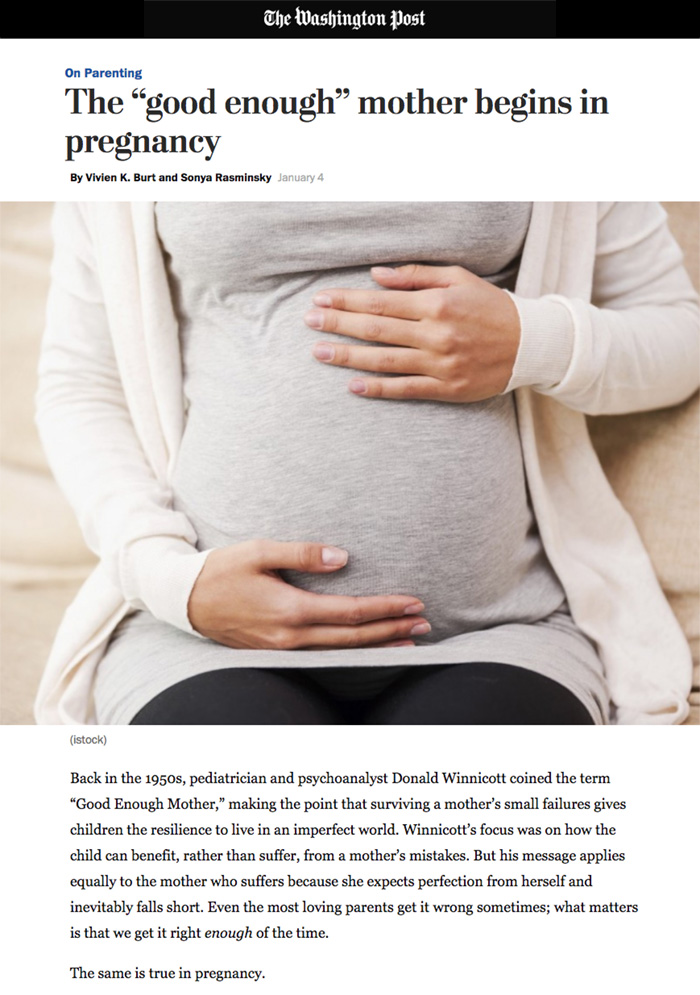Articles Archive
 The Washington Post, by Vivien K. Burt and Sonya Rasminsky January 3
The Washington Post, by Vivien K. Burt and Sonya Rasminsky January 3
Read Article Online
Back in the 1950s, pediatrician and psychoanalyst Donald Winnicott coined the term “Good Enough Mother,” making the point that surviving a mother’s small failures gives children the resilience to live in an imperfect world. Winnicott’s focus was on how the child can benefit, rather than suffer, from a mother’s mistakes. But his message applies equally to the mother who suffers because she expects perfection from herself and inevitably falls short. Even the most loving parents get it wrong sometimes; what matters is that we get it right enough of the time. […]
The Washington Post, by Vivien K. Burt, Sonya Rasminsky and Robin Berman March 3
Read Article Online
Whoever said, “Don’t cry over spilled milk” couldn’t possibly have been talking about breast milk. As reproductive psychiatrists who specialize in treating women who suffer from depression and anxiety during pregnancy and the postpartum, we see far too many tearful new mothers for whom breastfeeding is a source of self-recrimination. […]
Am J Psychiatry 173:3, March 2016
Download Article
It has been 25 years since the National Institutes of Health (NIH) Office of Research onWomen’s Health was founded to redress the dearth of health outcomes research in women. Since that time, to answer the need for science-based information on women’s health needs, the office has focused on ensuring the unbiased inclusion of NIH-sponsored clinical trials into women’s health research. […]
Listen to the audio presentation here.
Psychiatry 2010; 167:892–897
Download Article
This article describes complex, real-life issues faced by a woman with bipolar I disorder who wished to bear a healthy child while remaining psychiatrically well. The therapeutic issues include balancing treatment decisions that affect fetal and maternal risks. The authors address the importance of carefully considering the patient’s history of response to medications when evaluating risks to maternal and fetal health. They discuss the role of the psychiatrist as a part of the treatment team faced with unpredictable but not unexpected complexities, such as miscarriage, abnormal or questionable prenatal screening tests, gestational diabetes, and the emergence of fetal decelerations, preterm labor, and psychiatric decompensation. The article presents and evaluates treatment decisions made in the setting of multiple obstetric and psychiatric complications that do not clearly fit published algorithms. The importance of incorporating family and social supports as an integral part of the treatment plan is emphasized.
Can J Clin Pharmacol Vol 16 (1) Winter 2009:e6-e14
Download Article
The burden of mental illness in general, and depression in particular, has long been
underestimated. One in 6 persons in the United States will, at some point, suffer from major depression. Depression is second only to heart disease as a leading cause of medical disability in
the U.S. Women are vulnerable to mood instability at times of life-cycle related hormonal
challenge (e.g., including the premenstruum, pregnancy, post-miscarriage, postpartum and
perimenopause). Neurobiological, genetic, and psychosocial substrates underlie the increased
vulnerability for depression in women. The significant negative impact of maternal depression
on maternal and child health and psychological well-being and other possible consequences of
chronic depression will be reviewed.
The enormous burden of female depression on women, their children and their families has been well-documented over the past two decades. What remains is the need for serious, rigorously conducted research into effective and safe treatments for depression in women, particularly at times of reproductive transition.
Women’s Health in Primary Care
Download Article
Postpartum mood disturbances are common in women. Parents should be educated to expect postpartum blues, which typically subside without treatment. Postpartum depression, however, is debilitating and can impair the mother’s ability to respond to her infant, affecting the baby’s cognitive and emotional development. If untreated, it can lead to chronic depression or suicide in the mother. Postpartum psychosis is widely considered to be a manifestation of bipolar disorder, and it carries a risk of infanticide. Here Dr. Burt reviews the risk factors, clinical presentation, and treatment of postpartum mood disorders and considers the question of breastfeeding during treatment with psychotropic medication.
Journal of the American Medical Association — Vol 295, No. 5
Download Article
Context
Pregnancy has historically been described as a time of emotional wellbeing, providing “protection” against psychiatric disorder. However, systematic delineation of risk of relapse in women who maintain or discontinue pharmacological treatment during pregnancy is necessary.
Objective
To describe risk of relapse in pregnant women who discontinued antidepressant medication proximate to conception compared with those who maintained treatment with these medications.
Psychiatry 2001; 158:1001–1009
Download Article
The authors reviewed the risks and benefits regarding the use of psychiatric medications during breast-feeding as they relate to the health and well-being of mothers and their infants. Strategies are discussed to limit infant exposure to a medication while effectively treating the nursing mother.
 The Washington Post, by Vivien K. Burt and Sonya Rasminsky January 3
The Washington Post, by Vivien K. Burt and Sonya Rasminsky January 3